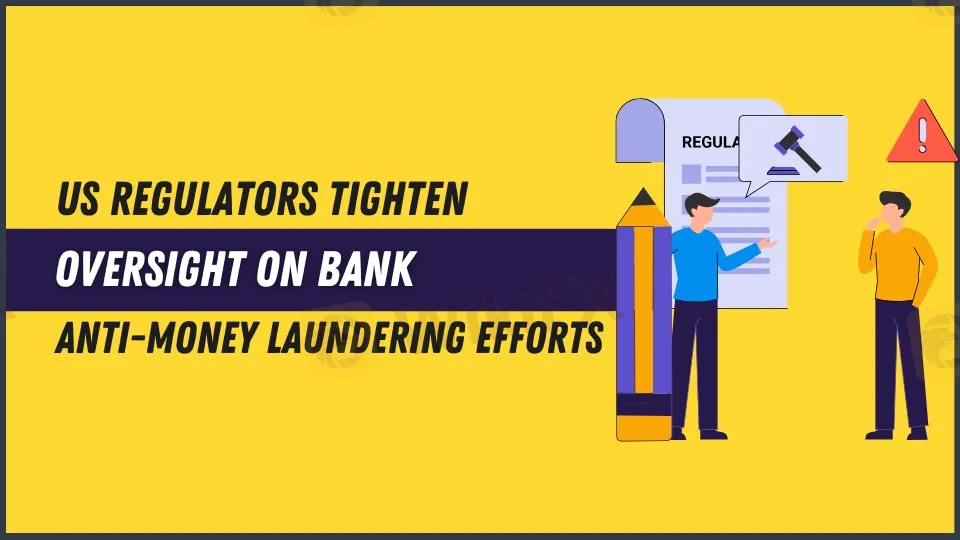US Regulators Tighten Oversight on Bank Anti-Money Laundering Efforts
Abstract:US regulators warn banks of stricter enforcement on money laundering rules, highlighting recent penalties against major lenders like TD Bank.

U.S. regulators have issued a stern warning to banks regarding increased scrutiny over financial crime prevention efforts. The message is clear: the government will not ease its focus on combating money laundering and enforcing strict know-your-customer (KYC) regulations.
This warning comes as U.S. financial authorities ramp up enforcement after a series of high-profile failures in the banking sector. Banks are facing heightened regulatory pressure, especially on their risk management practices and anti-money laundering (AML) programs. Recent actions indicate that regulators are more willing to impose penalties for non-compliance.
A significant example is TD Bank, which was slapped with a record $3 billion fine last month for violating U.S. laws designed to curb money laundering. The fine, which stems from the banks failure to detect and prevent illicit transactions, highlights the growing importance of effective AML monitoring systems. In response to these deficiencies, TD Bank agreed to a rare asset cap, restricting its future expansion efforts in the U.S.

This trend of intensified scrutiny is not limited to TD. Wells Fargo also found itself in the crosshairs of regulators in September after the Office of the Comptroller of the Currency (OCC) discovered weaknesses in the bank‘s safeguards against money laundering and other illegal activities. The OCC subsequently imposed restrictions on Wells Fargo’s ability to enter high-risk business areas.
Additionally, Bank of America faces potential regulatory actions due to concerns over its AML controls and its failure to adequately detect sanctions evasions and other financial crimes.
Greg Coleman, the senior deputy comptroller for large banks at the OCC, emphasized that these issues must be addressed quickly, as lapses in financial crime prevention pose serious risks not only to individual institutions but to the financial system as a whole.
With growing concern over global financial stability and security, U.S. regulators are likely to continue tightening their approach toward anti-money laundering measures. Banks are advised to review and strengthen their internal practices to ensure compliance with increasingly strict regulations.
Final Thoughts
As financial institutions face mounting regulatory pressure, the message is clear: no bank is immune from scrutiny. With penalties growing more severe and enforcement actions ramping up, banks must invest in stronger AML practices and compliance measures to avoid costly mistakes and protect their operations from future regulatory risks. The heightened focus on financial crime is likely to persist, making vigilance a top priority for banking executives moving forward.

Read more

Why Are 50,000 Traders Returning to Hong Kong Markets?
Know why 50,000 retail traders reactivated in Hong Kong. Learn how AI tools, mobile apps, and global strategies drive this market revival and investor growth.

Silk Road Founder Warns Against Fake ROSS Memecoins
Silk Road founder Ross Ulbricht warns crypto users against fake 'ROSS' tokens, highlighting risks in memecoins and debates on clemency amid Biden's final pardons.

IG Japan Extends US Stock CFD Trading Hours in 2025
IG Securities Japan extends US stock CFD trading hours to 6:00 PM–10:00 AM starting January 2025. View the complete list of 30 stocks and important trading updates!

Vanguard Settles $106M SEC Case Over Misleading Investors
Vanguard settles $106M SEC case over misleading investors on tax impacts of capital gains in retirement funds. Learn how this affects impacted investors nationwide.
WikiFX Broker
Latest News
Will Gold Prices Continue to Rise Due to Trump’s Tariffs?
Miami Firm Owner Pleads Guilty to $6M Ponzi Scheme Fraud
eToro Files for IPO with $5 Billion Valuation on NASDAQ
NBI Cebu Arrests Forex Trader for Illegal Investment Solicitation
PU Prime's "Feather Your Trades" Contest! Begin
Is FizmoFX a Scam? Fraud and Account Suspension of Traders
IG Japan Extends US Stock CFD Trading Hours in 2025
Which Zodiac Sign Makes the Best Trader?
ALERT! Warning against Livaxxen
BOJ to Announce Policy Decision This Week, Market Bets on a Rate Hike
Rate Calc

